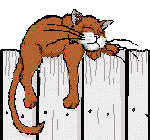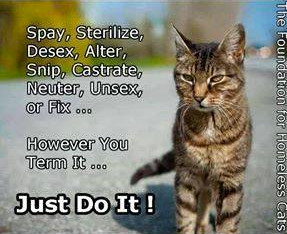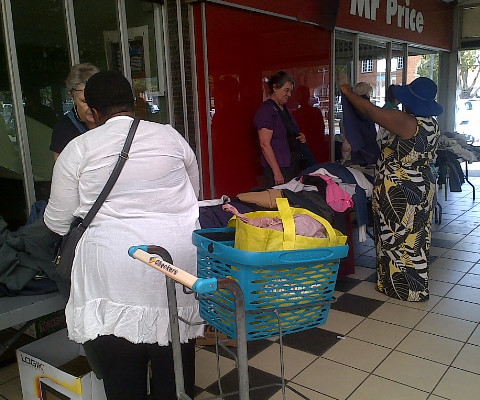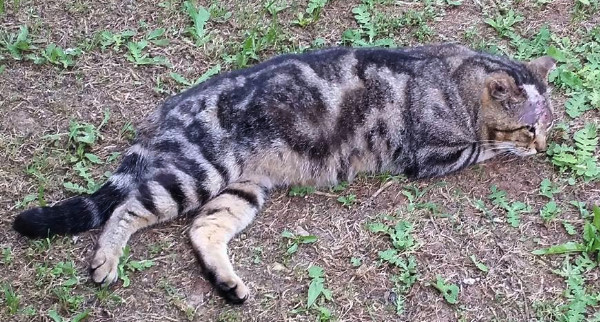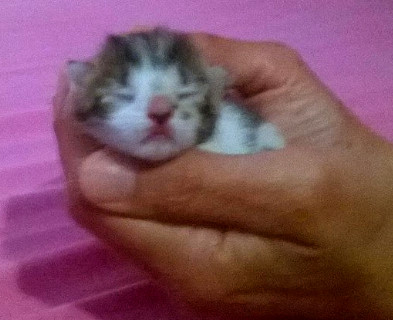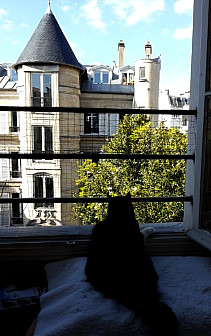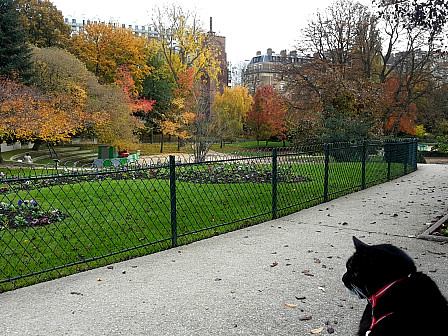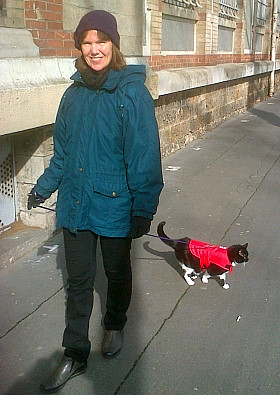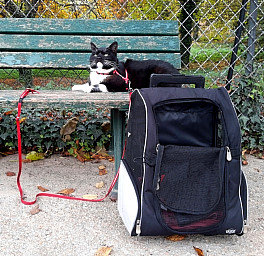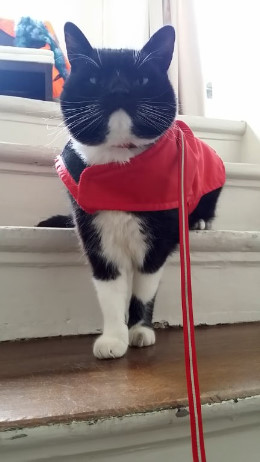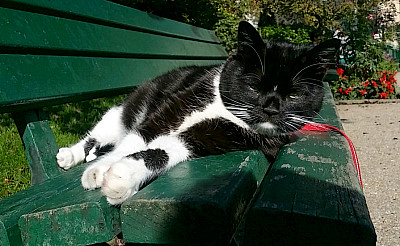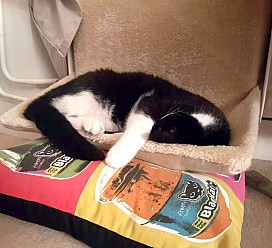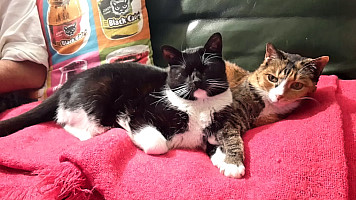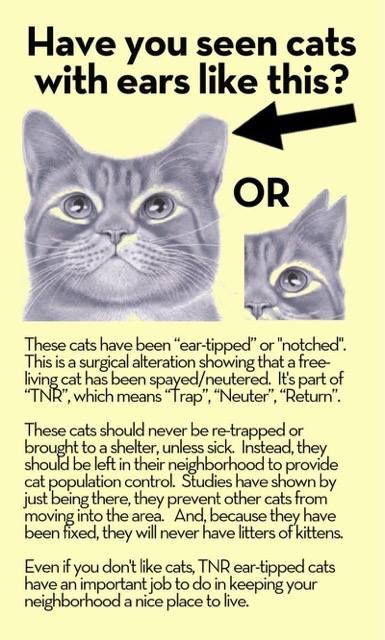 |
|
 |
 |
 |
 |
 |
 |
October 2015
Fundraising
|
From Lorna Although our mandate is only for feral or township cats, when we are asked to help with a situation such as that I describe below, we feel we cannot say no, as so many of these cats end up becoming feral and we feel it is better to be proactive rather than wait for yet more colonies to be formed. At least this way, we also prevent unwanted suffering. Earlier in October the Grahamstown Feral Cat Project started sterilizing a colony of approximately 11 cats, most of them females. The first two done were already pregnant and had 16 kittens between them ... which had to be aborted (RIP, little ones). Does anyone know of 16 good homes in Grahamstown, looking for kittens? As ardent animal lovers and pro-life advocates, we abhor the taking of an innocent new life, or any life for that matter, yet we have very little choice but to abort kittens if they are discovered too late to avoid it (we do not "euthanase" any healthy kittens or adult cats). So, it is left to the poor, kind vets to do this horrible procedure. And for this, we are very grateful to Drs Gilfillan and Clayton, for their assistance in sterilizing at welfare rates any cats that no other human takes responsibility for. We are fortunate that they treat our little ferals and homeless felines with the same kindness and care as they would show any pampered pet. We are also grateful to their staff, especially Ammy and Tersia for their kindness to the cats. We do this work with a great deal of love and care, but also, frequently, with much sadness. Thank you to kind and generous members of the public who support our TNR programme, without you we could not do it - even welfare rates are costly these days. So, please, make a plan to sterilize your pets before they fall pregnant - and, if you can afford to, perhaps sterilize the companion animal of someone who cannot afford it themselves? Thank you. |
At the same time we were asked to remove another heavily pregnant female from the same property. The family no longer wanted her and none of us had the heart to have her babies aborted as well so urgent calls for a foster home resulted in mama (now called Grey from the TV series Grey’s Anatomy) and her unborn babies being adopted by Carmen Henning and her family immediately, with Lorna transporting her to her new home just outside Grahamstown. We were all expectantly awaiting what we presumed was the imminent arrival of her babies, but had to wait until Sunday 26th October, when four gorgeous tabby and white, fat and healthy babies made their arrival. We are so happy that they are all settled in their wonderful new home and of course, the project will be sterilising all of them at welfare rates. Sadly, one of the kittens only lived a few days.
|
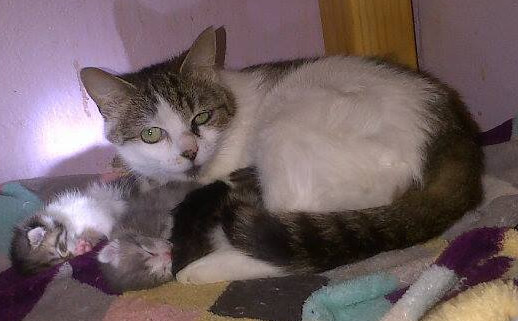 |
A few weeks ago we were alerted to a feral mama and her tiny kittens on campus. Unfortunately, the babies were handled by people when momcat ran away and by the time Nikki could get up to the area, she had moved the whole family. The best Nikki could do was leave her contact details with Rhodes staff who work in the area and hope that they will all turn up safe and sound.
What should you do if you come upon kittens outdoors?
First investigate whether the young 'uns are on their own. Their mother may be away temporarily to hunt for food, she may be hiding because you are there, or she may be moving the family, one by one, to cushier digs. Back a ways off, stay still, and watch. Give her some time - at least a few hours.
Do not under any circumstances handle the babies. If the mom returns, she will immediately relocate them to a safe place, and it may be very difficult to track them down again.
If the mother shows up your action plan depends on whether she is a stray (a pet who has lost her home) or feral (a wild animal who wants nothing to do with you). It’s easy to tell the difference: try to pet her. If she won’t let you close enough for petting, try bribing her with food to get her within arms’ reach.
If she is feral you’re looking at a TNR (trap-neuter-return) situation. Keep in mind that kittens younger than eight weeks should stay with their mother if at all possible; if they are in a safe location, they are best off remaining there with her. Bring them food, water and shelter.
If the kittens are more than four months old, don’t scoop them up and carry them off — they probably won’t take kindly to it. Treat them like feral cats (meaning they need TNR and not adoption) unless and until they prove otherwise.
Lost Cats
MISSING! Tigger is new in the Hellier Street, Fort England area and went missing from her new home on 12 October. Tigger was one of Beth Dickerson's cats and may have tried to make her way back to New Street. If you see her in either area, please contact Lorna on 076 353 0726 or Cathy on 046 622 9133. She is a very timid cat and will be afraid. Thanks.
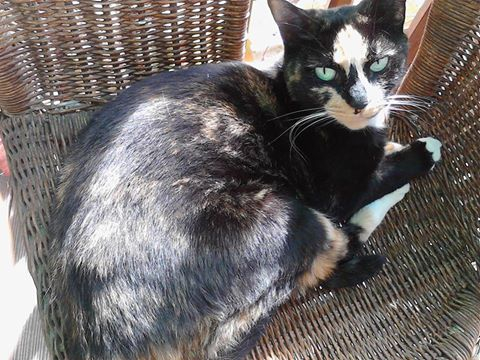
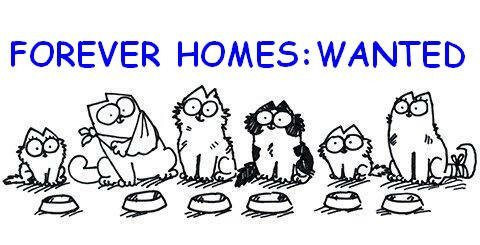
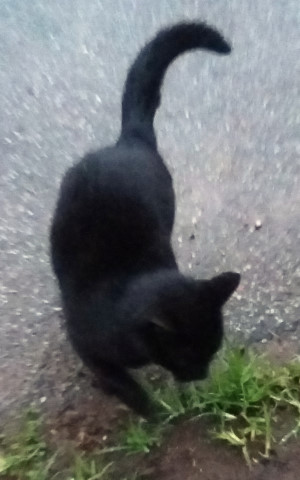 |
From Ros I feed a very lovely, gentle black kitty called Sooty in the ditch. She is already sterilised (thanks to Lynne and Lorraine) and has the most loving nature. As the rest of the colony is no longer there (we don’t know why) I wish I could find her a forever home - she is lonely and waits for me every morning, rolls onto her back and enjoys a tummy rub.
If anybody would like to know more about Sooty, please contact Ros to arrange a meet and greet. Her cell number is 082 758 4903. It would be awesome if she could find a home. So many of our “ferals” are so tame and well-socialised with humans, but unfortunately there are just not enough homes. I received the pic from Ros this morning, and she apologises for the poor quality, but Sooty was more interested in getting loves than in posing for the camera. |
News of Adopted Cats
Walking with Pandy in Paris By Jeanne Berger We’ve just got back from our walk, today to the Parc St Perine to see the autumn leaves before they disappear. I’ve settled down to write this article, with a cup of rooibos tea. Pandy is on his blanket-covered cushion on the coffee table, next to an open window, looking out at the trees and listening to the birds.
Background information for those who don’t know me and Pandy is that the latter is one of those very special cats – a GFCP rescue cat, initially adopted by Lorna Grant and taken over by the Berger household a month after being rescued from stables. His first year had more near-death experiences – very bad cat flu, eye infections followed by a corneal ulcer, and a week-long disappearance, never mind the hair-raising regular visits across busy Worcester Street. That was 2011 … and in November of that year Guy (my husband) took on a job at Unesco and moved to Paris. I was to follow in May 2012, but in the meantime we had decisions to make about 15-year old Popsy and 1-year old Pandy. None of our family members were in a position to take over either of the cats and after much deliberation we decided we would take them to Paris (as we had done with 2 cats in 1985, to London). The EU requirements were relatively easy to carry out - a special Onderstepoort rabies test to be done 3 months before departure and microchips to be inserted. Travel arrangements for them were made with an agency in PE and at the end of May I flew on the same planes as the cats, via Johannesburg and Zurich. We’d arranged for an agency to pick up the cats at the airport in Paris and to deliver them to our apartment. They were waiting for us when Guy and I arrived and other than smelly boxes, the cats were fine and ready to explore their new surroundings.
Getting him used to the noise of traffic in Paris was another matter though. Initially we walked him in the gardens of the complex of the apartment we first stayed in (we also walked Popsy in these gardens – she had no problems with the harness and leash). Guy then started carrying him in his cat bag on the pavements, and getting him to walk for short periods. We moved to our current apartment after 10 months and although there is a lovely small garden he can look down onto, he’s not allowed in the garden. Luckily we found Parc St Perine, with its “dog” walkway, which is a 5-minute walk from us. We also have a square across the road from us, with trees and benches where he can walk, and sit on the benches watching the pigeons and commuters emerging from the metro station. Often we just walk him around the block and sometimes he gets a walk next to the Seine River (with a view of the Eiffel Tower), which is also close to us. We also occasionally take him to the Bois de Boulogne, a large forested and park land area which is a 15-minute cycle away from us, and he loves walking next to the lake looking at the ducks.
|
Donations
(29 September to 31 October)
Thank you so much to everyone who donated. Your support means so much to us and helps us to continue with our work.
If making electronic payments please remember to include WILDCAT and your name as a reference so that we can thank you. Please email proof of payment to: l.grant@nelm.org.zaViv Botha
Jennifer Gon
Colleen Duffy
Sheryl Drennan
David Foulkes (for “mognosh”)
Sheryl Drennan
Deon Fourie (for cat food)
Heather Wallace
Jeannie McKeown
About Us
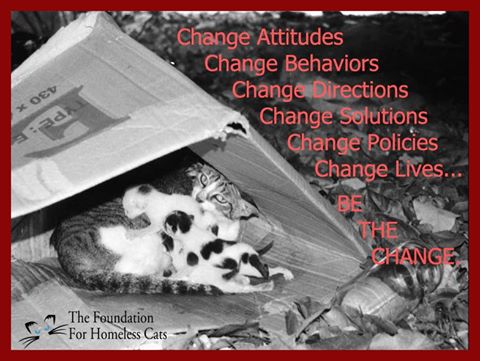
All donations go to sterilisation and a small portion to food.
Occasionally there are costs for veterinary care of ferals who are ill or injured.
We appreciate your generosity greatly as it enables us to continue helping the feral cats.
Spays cost us R440 and neuters R287,
plus extra for any complications
such as pregnancy or undescended testes.
The adoption fee is R500, which includes first deworming and inoculation and obligatory sterilisation.
If you would like to donate any amount, please deposit into our vet account at:
The Grahamstown Veterinary Clinic,
Standard Bank Account No 282625054
Branch Code 050917
Please add the reference "W/CAT" and your name,
and please notify us if possible
so that we can follow up donations in case of
accidental misallocation
Please do not take any feral/stray cat into the vet for attention and charge it to our Wildcat account without prior approval from Lynne.
The Wildcat account with the vet is meant for sterilisation of ferals and will only under certain exceptional circumstances be used for other procedures.
Grahamstown Feral Cat Project uses the TNR (Trap, Neuter & Return) approach - globally recognised as the most humane, least costly and most sustainable way of stabilizing feral cat populations.
Volunteers humanely trap the feral cats; we take them to the vet to be spayed or neutered; the tip of the right ear is snipped off so we can easily identify that they have been sterilised; we return them to their original territory where they live out their lives (adult ferals cannot be tamed). Feral kittens, wherever possible, are fostered, tamed and homed.
Archived Newsletters
December 2014
January 2015
February 2015
March 2015
April 2015
May 2015
June 2015
July 2015
August 2015
September 2015
The Grahamstown Feral Cat project promotes responsible pet ownership. This includes proper care (feeding, vaccination and preventative treatment against parasites, etc.) and sterilisation to prevent unplanned kittens and reduce the number of homeless animals. See Useful Facebook Pages Grahamstown Animal Network (GRAN): https://www.facebook.com/groups/GRanimalove/ |
To subscribe to our monthly newsletter, please click here or follow this link:
http://fables.activedns.co.za/cgi-bin/mailman/listinfo/gfcp-list
To unsubscribe, click here or follow this link:
http://fables.activedns.co.za/cgi-bin/mailman/options/gfcp-list
Page updated on February 6, 2018 |
TOP |
